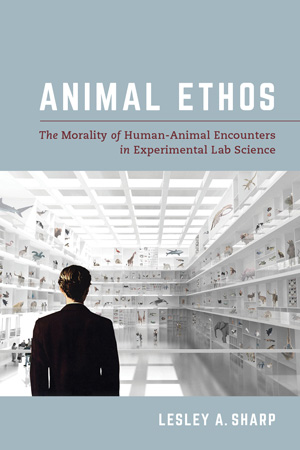
Animal Ethos is framed by efforts to unearth and decipher moral thought and action in experimental forms of laboratory science. More specifically, as an ethnographic project, it attends to the ordinary, everyday, or mundane aspects of human-animal encounters in lab research. I purposefully distinguish between bioethics—or regulatory principles (that may be codified as law) that determine what one can and cannot do experimentally—and morality, namely, the personal and private musings of lab personnel whose research and livelihoods hinge on the use of animals for furthering medico-scientific knowledge. I consider moral thought in science as an imaginative project, where unexpected conundrums may challenge one to pause and consider the limits of dominant ethical frameworks. Such reconsiderations lie at the heart of the making of oneself as a moral being, where the core questions I’ve posed to involved lab personnel might be phrased as “how do you think of your work when you go home at the end of the day?” or, as animal activists might restate it, “how do you live with yourself, knowing what you do?” I underscore here that I am not interested in whether one is practicing ethical science but, instead, in the private, subjective (and interspecies) dimensions of ongoing, often lifetime, work in which one engages, and how this plays out in personal efforts to forge a moral sense of self against the backdrop of scientific pursuits.
My earlier ethnographic engagements in specialized realms of transplantation—as described in my works Strange Harvest (2006, University of California Press) and The Transplant Imaginary (2013, University of California Press)—taught me that, whereas lab researchers readily convey complex understandings of regulations that define “ethical research,” there exists no similarly robust lexicon for describing personal experience and sentiment. Indeed, research personnel often explained to me that morality is the purview of philosophy and religion, not science. As I slowly came to realize, though, when lab personnel talk about animals, which they do openly and often, they shift to a highly personalized, moral register. With this in mind, Animal Ethos is not a study of lab animals, but instead employs “animal talk,” so to speak, as a method for accessing how lab scientists think about the sociomoral underpinnings of what they do. As Claude Lévi-Strauss so famously proclaimed, “animals are good to think.” With this adage in mind, it is through the animal that I access moral thought and action among those whose careers rely on non-human species as essential research participants.
I’ve long been interested in the moral underpinnings of human life on collective (shared) and personal (private) levels of experience. Indeed, the “ethics” of everyday life—or what Gregory Bateson referenced as ethos—is a foundational concern within anthropology. The discipline boasts robust analytic and methodological approaches to the inherent messiness of human life, and over the past two decades I have investigated how a range of involved parties think through and respond to the moral challenges of human organ transfer, highly experimental visions of organ replacement, and, most recently, animal science. These are complex, specialized, and hierarchical worlds. Much of my work is driven by the premise that answers lie not solely with a few elite specialists (for instance, surgeons, who perform transplant surgeries, or the principle investigators in labs), but with a host of still other—though often unrecognized—experts. Within laboratories, they range from postdoctoral students to undergraduate interns, lab-based veterinarians and veterinary assistants, and lab animal caretakers to the technicians who clean animals’ cages. All parties are engaged in the daily moral project of animal science, and Animal Ethos is an effort to disentangle a range of behaviors, emotions, and responses to the everyday aspects of human-animal encounters in such realms.
For example, as a medical anthropologist, I am especially interested in how codified rules regarding “animal welfare,” which spans such key domains as animal housing practices, feeding procedures, and breeding, culling, and killing, translate into daily regimens of “care” in domains where interspecies encounters are inescapable. The volume Care in Practice: On Tinkering in Clinics, Homes and Farms (2010, Transcript-Verlag) edited by Annemarie Mol, Ingunn Moser, and Jeanette Pols, has proved revelatory because of the editors’ insistence that “care” be employed analytically and across species. I’m especially interested in the emotional consequences of working with animals on a daily basis, or what I reference as the “sentimental structures” of affective laboratory labor. Although lab science is rife with taboos that prohibit emotional attachment (for instance, in many labs, animals are deliberately numbered and not named in efforts to objectify them), labs are replete with eclectic practices that defy these taboos and that signify emotional attachment not as aberrant but widespread, ranging from the subversive to the mundane. Such practices enable one to witness an unfolding of how moral thought is put into action, and thereby transform the ethos of knowledge production in experimental work. I emphasize here that this is a creative domain marked by serendipitous responses that exemplify efforts to “think outside the box.” In some instances, these efforts can prove transformative to animal well-being, looping back to reconfirm one’s personal moral core; other parties openly defy regulations, as evidenced in ongoing efforts either to memorialize dead animals or to rescue still other creatures from euthanasia by adopting them out to the public; at still other moments, if we attend to the moral histories that inform animal welfare, we encounter fascinating and, sometimes, peculiar efforts to enrich animals’ lives, perhaps best illustrated by the widespread insistence that non-human primates, like humans, are avid television viewers.
For a reader who is most interested in browsing the book’s contents, there are several points of entry. For those unfamiliar with my work, they’d probably find the Introduction (“Moral Entanglements of Experimental Animal Science”) informative (although, perhaps, dry!) reading, because it sets up key theoretical frameworks that inform the rest of the book. For an account of the curious history of television in labs, I recommend Chapter 2, “Why Do Monkeys Watch TV?” The most difficult chapter for me to write was the third one, “The Lives and Deaths of Laboratory Animals,” which stands alone as an “An Interlude” in the middle of the book. This chapter takes as its premise the inevitability of animal death (widely referred to as “sacrifice” in lab science) because the vast majority of research protocols require that research animals be killed once their involvement in a project comes to an end. Chapter 5, “The Animal Commons,” is my own effort to think outside the box by considering how the prohibition on animal sharing might be altered so as to alter both the ethical and moral premises and consequences of experimentation. My personal favorites, though, are Chapters 1 (“The Sentimental Structures of Laboratory Life”) and 4 (“Science and Salvation”), because it’s here that I wrestle with the interspecies complexities of intimacy, affect, and emotion. Chapter 4 also allowed me to address mourning and memorial practices; those familiar with my previous research know of my longstanding interest in end-of-life issues and mortuary practices.
One can never predict how one’s work will be received. What has intrigued me thus far, in the few months since the release of Animal Ethos, is the interest it has sparked among lab-based personnel, especially those whose day-to-day work concerns lab animal care and welfare. I have received requests to participate in discussions and initiatives about how to think creatively about lab practices as well as how to speak publicly about realms of research, and associated daily work, that involved parties assume are highly stigmatized.
More specifically, researchers and other lab personnel are reluctant to tell others—including close friends and family—about any work that involves animal experimentation. Their interest and invitations stand in stark contrast to my earlier work on organ transplantation: as I soon learned there, biomedical personnel express faint interest in reading analyses of their professional work, whereas involved lay parties, such as the recipients of transplanted organs and the kin of deceased donors, are avid readers, including anthropological studies of their lives.
On yet another front, I’ve been surprised by the responses I’ve encountered among members of my own profession: whereas successful anthropological field research is based on the premise of cultural relativism, a project that addresses the lives and deaths of research animals exposes a fragile line demarcating where one’s own moral principles can eclipse a professional ability to suspend one’s judgment of a specialized social domain. In several instances I’ve faced the perplexing question, “why don’t you tell us how to think?” My purpose, however, is not to craft others’ moral frameworks but, instead, to open up a world that is troubled on a daily basis by the messiness of the moral. The lesson here is that animals—especially research animals—inspire highly emotional responses in many of us, regardless of one’s training and profession.


Lesley Sharp received her doctorate in medical anthropology from the joint program of the University of California, Berkeley, and the University of San Francisco. She is the author of six monographs: her earliest work addresses indigenous healing and mortuary practices in Madagascar; later work investigates the transformative, sociomoral dimensions of human organ transfer and associated domains of highly experimental research; and her current work is on the moral underpinnings of lab animal science. Sharp holds the Barbara Chamberlain & Helen Chamberlain Josefsberg ’30 Professorship in Anthropology at Barnard College; she is also a Senior Research Scientist in Sociomedical Sciences at the Mailman School of Public Health, Columbia University, and a Fellow of the Center for Animals and Public Policy of the Cummings School of Veterinary Medicine, Tufts University.